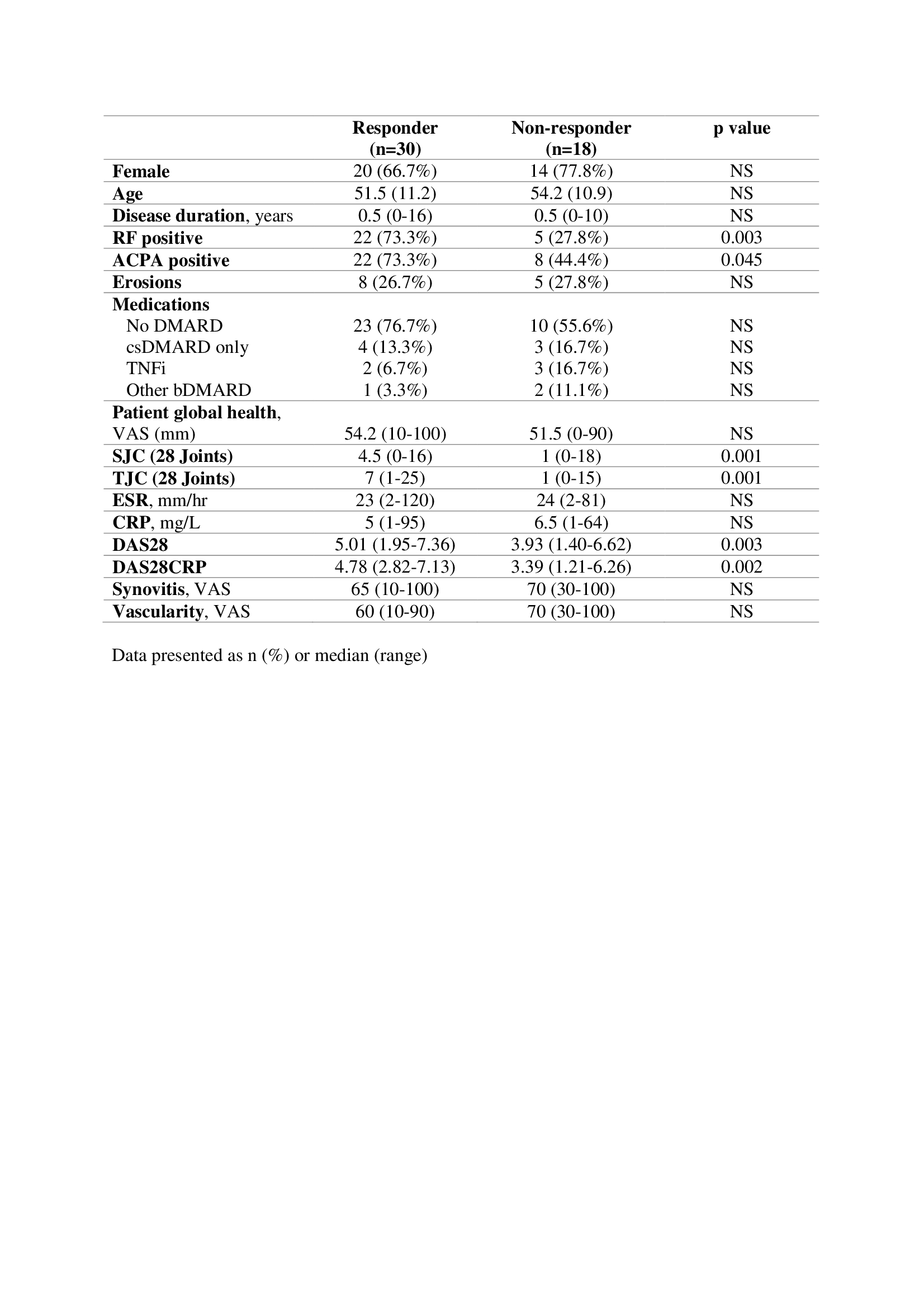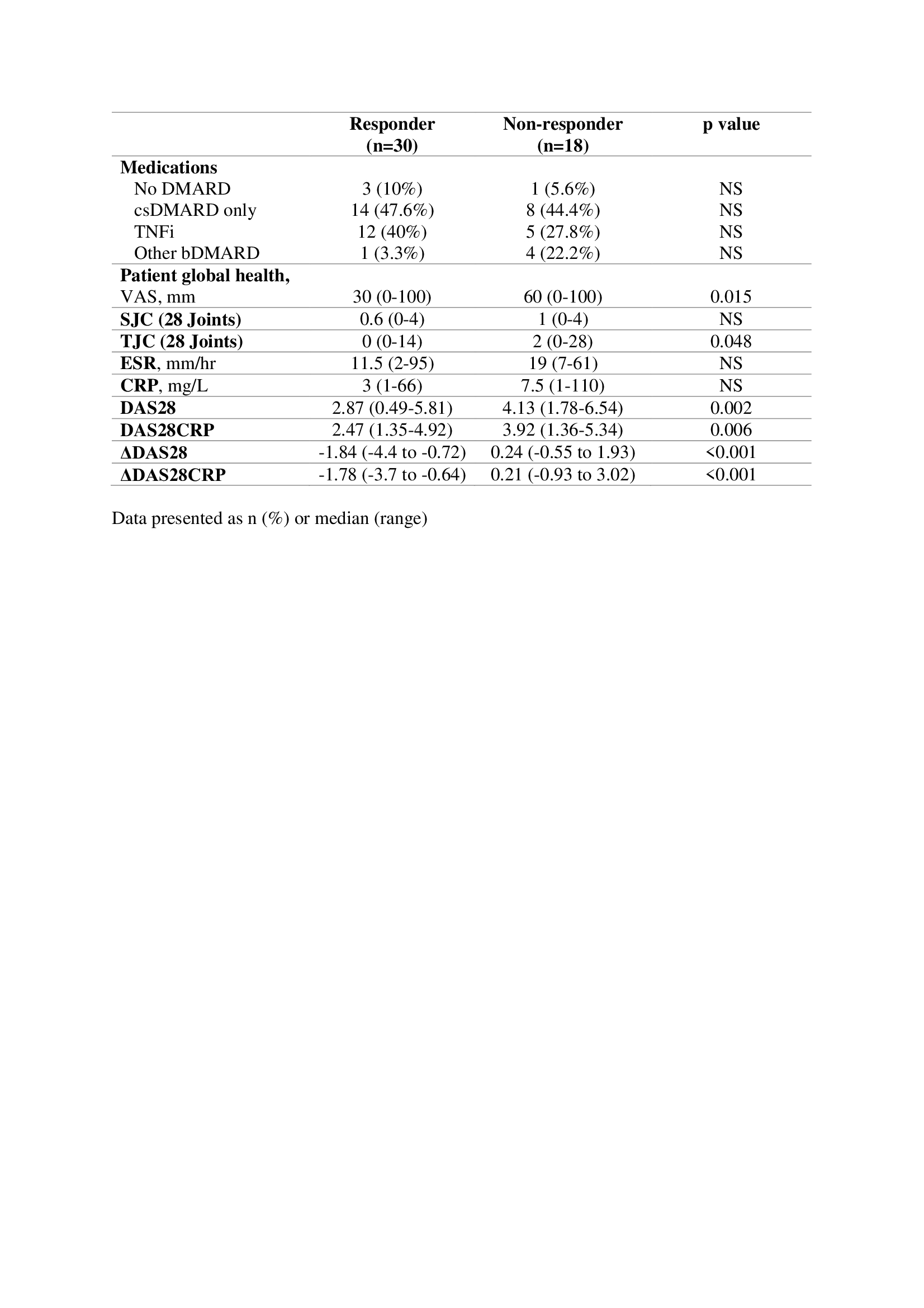Session Information
Date: Saturday, November 7, 2020
Title: RA – Diagnosis, Manifestations, & Outcomes Poster II: Biomarkers
Session Type: Poster Session B
Session Time: 9:00AM-11:00AM
Background/Purpose: Despite recent therapeutic advances, our ability to predict prognosis and therapeutic response in RA remains imprecise. This study examines for biomarkers predictive of outcome at one year following arthroscopy.
Methods: RA patients were prospectively recruited and underwent knee arthroscopy performed under local anaesthetic. Each patient underwent a careful systematic assessment of demographic, clinical, and serologic factors on the day of arthroscopy and were reviewed at 2 weeks, 3, 6 and 12 months post arthroscopy. Erosive disease was defined based on plain-film radiographs of hands and feet. Disease activity at one year was used to define treatment response into responders (moderate/good EULAR Response) and non-responders.
Clinical characteristics, synovial tissue cell profiles and immunohistochemistry were analysed for T Cells (CD3), B Cells (CD20, CD138), macrophages (CD68) and vascularity (Factor VIII) to establish predictors of treatment response. All areas of each biopsy section were examined and the sub-lining layer independently scored by 2 observers using a well-validated semiquantitative scoring method, ranging from 0 to 4 (0=no staining, 1=< 25%, 2=25–49%, 3=50–74%, and 4=75–100% staining). Factor 8 was scored by calculating the mean count of stained blood vessels per high-power field (at 20X magnification).
Results: Baseline features of the study participants are presented in Table 1. There were no significant differences in gender, age, disease duration, medications, erosive status, ESR, CRP or synovitis or vascularity at arthroscopy. Interestingly, rates of RF and ACPA positivity, tender and swollen joint counts, DAS28 and DAS28CRP were all higher amongst treatment responders. One year outcomes are shown in Table 2. Immunohistochemistry was a very poor predictor of treatment response. There were no significant differences between the two groups in CD3, CD20, CD138, CD68 or Factor 8 score (Table 3).
Conclusion: In this small study, seropositivity and disease activity were higher in responders. Baseline immunohistochemical staining was not a good discriminator of treatment response.
 Table 1. Baseline characteristics
Table 1. Baseline characteristics
 Table 3. Immunohistochemistry scores
Table 3. Immunohistochemistry scores
To cite this abstract in AMA style:
Murray K, Low C, Young F, Biniecka M, Mylod E, Fearon U, Veale D. High Disease Activity at Baseline and Seropositivity Are Associated with Treatment Response at One Year Post Synovial Biopsy in RA Patients [abstract]. Arthritis Rheumatol. 2020; 72 (suppl 10). https://acrabstracts.org/abstract/high-disease-activity-at-baseline-and-seropositivity-are-associated-with-treatment-response-at-one-year-post-synovial-biopsy-in-ra-patients/. Accessed .« Back to ACR Convergence 2020
ACR Meeting Abstracts - https://acrabstracts.org/abstract/high-disease-activity-at-baseline-and-seropositivity-are-associated-with-treatment-response-at-one-year-post-synovial-biopsy-in-ra-patients/

